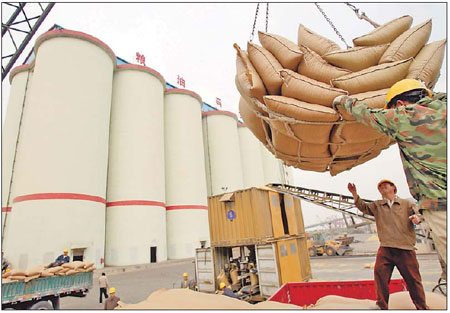China-US
US farmers basking in growth of Chinese ties
Updated: 2011-07-15 07:39
By Zhang Yuwei (China Daily)
NEW YORK - Back in January, when soybean farmers Jim Call and Mike O'Leary, both from Minnesota, met a Chinese delegation who accompanied President Hu Jintao's state visit, they knew it was a good sign for their businesses.
|
|
"It is all about relationship building. You get to meet your buyers and discuss with them different issues in person," said Call, also a member of the Minnesota Soybean Research & Promotion Council.
"For me, a soybean farmer, to meet those Chinese officials, it was, of course, a bit intimidating but the meeting was good," Call added during a recent interview with China Daily.
Related: China will increase US soybean imports
China is the world's largest customer for US soybeans and also the top importer of soybeans from Minnesota. Every year, more than 60 percent of Minnesota's total soybean exports go to China, according to the Minnesota Department of Agriculture (MDA). The top US soybean producing states are Iowa, Illinois, Indiana, Minnesota and Nebraska.
Between 2009 and 2010, China imported more than 825 million bushels of US soybeans, valued at more than $7 billion. Seventy million bushels were from farms in Minnesota.
"China is extremely important to Minnesota agriculture, especially soybean farmers Look at a Minnesota soybean field and realize that every fourth row is purchased by China," O'Leary said.
Soybean exports comprised about 68 percent of all US agricultural exports to China from October to May, according to the US Department of Agriculture (USDA). Cotton is the No 2 commodity in exports but it is only 20 percent of the value of soybean exports.
The value of the export link also reflects on the job market, especially when the US economy is recovering from a major recession.
"Minnesota benefits from trade with China, with more than 7,000 jobs in the state directly or indirectly related to agricultural exports to China," said Su Ye, a program director at the MDA.
Minnesota is only one example of the growth in China-US agricultural trade. Recent data from the USDA showed that with $15 billion in farm exports, China accounted for nearly 20 percent of all US agricultural exports worth a total of $75 billion in the first half of 2011.
"As expected, China is our top export market," US Agriculture Secretary Tom Vilsack said in a statement.
China's agricultural trade has grown rapidly, particularly since the country joined the World Trade Organization in 2001.
China itself is also a global agricultural player, particularly in fruits, vegetables, rice, cotton and pork. Overall, China is largely self-sufficient in agricultural products, except for a few key imports, including soybeans, vegetable oil and cotton.
China became the top US agricultural export market for the first time in 2010 - taking the top spot from Canada - and is also expected to be the top market in fiscal year 2011, according to the USDA.
US agricultural exports to China are playing a significant part in achieving US President Barack Obama's National Export Initiative - the goal of doubling all US exports by the end of 2014.
"When we look at the growth that we've seen in the past and the possibility if we can get some of these market access issues resolved that could amount to an additional billion dollars of export trade to China," Jim Miller, US undersecretary for Farm and Agricultural Services, said in a statement.
Call, a fifth-generation soybean farmer, said when his grandfather started growing soybeans in the 1940s, what occurred in overseas markets didn't really affect local farmers at all.
"Now we are in a global economy, anything that happens overseas - any trade issues, especially with China - affects my farm directly in my green prices," Call said.
"It is important for the US to keep this relationship (with China) because agriculture is one of the only industries that's helping us to reduce our (trade) deficit with China," he said.
The US had a trade deficit of $84.58 billion with China in the first six months of this year, according to Chinese Customs.
More than 20 years ago, China was a major exporter of soybeans - a major competitor of US soybean growers, Call said.
"For the past eight years, however, it (China) has become a major importer for us," Call added.
Call and O'Leary have visited China several times, meeting customers and viewing export facilities.
Call also traveled with the Chinese delegation, which consisted of representatives from China's 10 largest soybean crushers (traders of soybean futures commodities) to Chicago in January, where a $6.6 billion deal was signed between China and the US on soybean purchases.
The deal, which Call said equates to about 423 million bushels of soybeans, was a huge one and it's more than doubled their production in Minnesota.
"The trade we do with agricultural products (with China) keeps farmers in Minnesota and the US viable. A lot of farmers worry that for some reason China will quit buying from us, it will be devastating to our green prices," Call said.
China Daily
(China Daily 07/15/2011 page11)

Specials

Economy slows down
A 9.5 percent growth in the second quarter eased concerns over a hard landing.

Mullen visits military bases
Top US military officer praised the transparency of the Chinese military.

90th anniversary of the CPC
The Party has been leading the country and people to prosperity.
